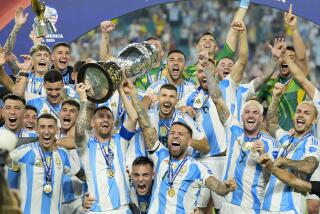Mild Conflicts Mark Street Celebration of Iran’s Soccer Victory
- Share via
TEHRAN — Dozens of baton-wielding Basij marched up and down Mother Square on Wednesday night, jeered by thousands of teenagers whom the much-feared militia had come to subdue after Iran’s latest soccer victory. But each time the armed throng drew near, the hecklers retreated, disappearing into an even larger crowd of Iranians who had simply come to watch.
The cat-and-mouse game was typical of the evening’s face-offs between authorities and rowdy citizens, unlike two previous postgame riots that led to 1,200 arrests in the capital alone. No windows were broken, and no protesters were seen chanting anti-government slogans, as was the case last week.
Revelers explained that they had come to celebrate, not revolt, and authorities responded in kind. The deputy governor of Tehran had decreed that arrests would be kept to a minimum. Officers in riot gear appeared willing to comply. Besides, they had their hands full doling out pieces of a 12-layer cake the government provided to celebrate the eve of a Shiite holiday celebrating Islam’s 12th imam.
Traffic ground to a halt on many of the capital’s main thoroughfares, blocked by largely male crowds that danced, waved flags, blew plastic horns and cast cherry bombs to celebrate Iran’s 3-0 victory over the United Arab Emirates in the playoffs for the 2002 World Cup.
“If they had taught us from the beginning how we can have fun, maybe it would turn out to be more constructive than breaking windows,” said Keyvan, a 20-year-old reveler who would give only his first name. “When we only have one time every four years where we can go out and express our happiness, riots happen.”
Several reform-minded members of parliament interviewed this week agreed. Postgame demonstrations are a symbol of young people’s frustration with a system that provides few opportunities for them to express themselves socially or politically, they said.
An aggressive crackdown on owners of satellite dishes in the last week may have been a government backlash against young people’s actions, the lawmakers added. Some officials have said that recent unruly demonstrations have been incited by Persian-language broadcasts from abroad, in particular from Los Angeles.
As of Tuesday, 10,000 satellite dishes had been confiscated, carried off by the truckload, according to one parliament official. Many more have been pulled off rooftops by owners who fear losing their coveted link to the outside world and being fined from $1,250 to $3,750.
Expatriate broadcasters in L.A. such as Zia Atabay deny having incited riots and say they are just giving young people a voice. “We just put them on the air, and they say what they say,” Atabay said Wednesday at his North Hollywood NITV studio. “They say: ‘We want freedom. We want democracy.’ ”
Iranians interviewed this week in Tehran insisted that the influence of Persian-language satellite channels such as NITV has been exaggerated. A few said they consider expatriate Iranian broadcasters to be outsiders who drink liquor and wear ties--symbols of Western decadence--and have no business trying to conduct a revolution from abroad.
“Maybe 10% of the people who go out are doing so because they listen to NITV,” said Hassan, a factory owner and subscriber to the L.A. channel who did not want his full name published. “The rest are out there because of their own opinion. They don’t need a satellite dish to tell them what to do.”
Hassan said he would put his dish back up as soon as the soccer playoffs were over.
The largely reformist parliament is likely to consider a bill lifting the ban on satellite dishes in the coming weeks, said lawmaker Golamheidar Ebrahimbai-Salami, who opposes the ban.
“The law is not a law that can be followed,” said fellow reformist lawmaker Fatemeh Haghighatjuo. The ban was imposed six years ago in an effort to purge Iran of Western influences.
*
Times staff writer Nita Lelyveld in Los Angeles contributed to this report.
More to Read
Sign up for Essential California
The most important California stories and recommendations in your inbox every morning.
You may occasionally receive promotional content from the Los Angeles Times.













